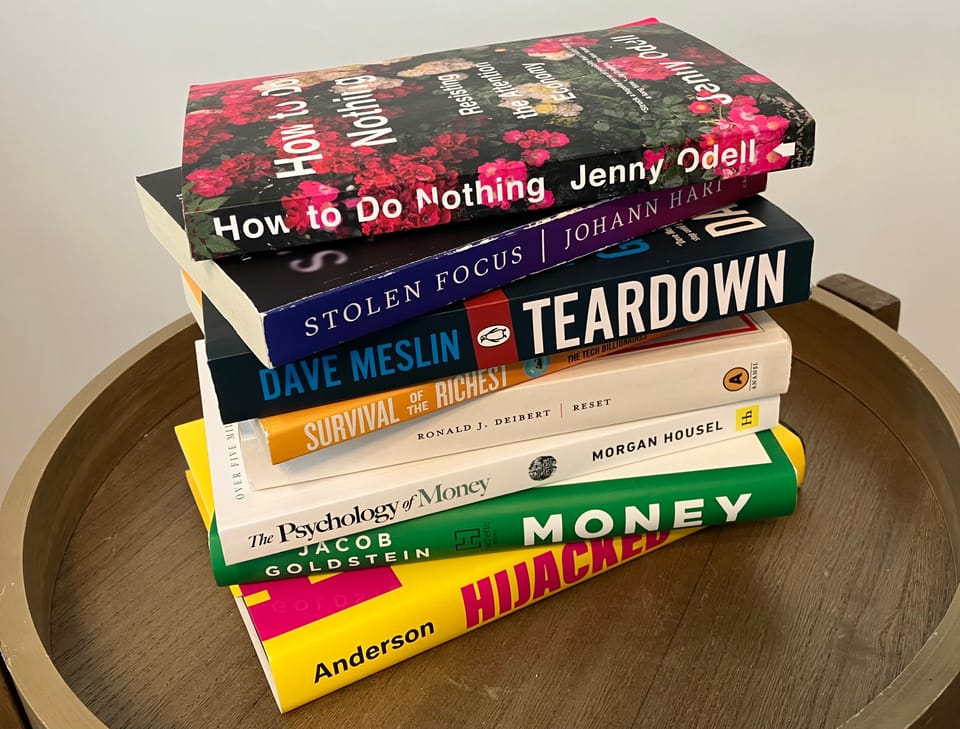10 (Actually 12) Books that Explore Our Complex Civilization

I'm committed to publishing at least one post per month in 2025, and not every one will be a personal essay. In this time of great anxiety and fear, I thought it might be helpful to share some of the books I've read (or listened to) as research for my own non-fiction project, which attempts to navigate overwhelm, inequity, and existential dread. All of these books are filled with sobering observations about the state of the world, but they also provide ideas for how we might confront the layered and complex problems we face.
- Survival of the Richest: Escape Fantasies of the Tech Billionaires by Douglas Rushkoff — A scathing and highly engaging assessment of the flawed mindset behind the ultra-rich technocrats who control our modern economy. This book is loaded with personal anecdotes, cultural critiques, and stories about the history of the digital economy.
- Reset: Reclaiming the Internet for Civil Society by Ronald J. Deibert — From one of the world's foremost experts on cybersecurity, internet censorship, and human rights, this book explores the economic, psychological, and environmental impacts of the internet – and it provides a framework for "resetting" our relationship to the global network that connects us all.
- Hijacked: How Neoliberalism Turned the Work Ethic against Workers and How Workers Can Take It Back by Elizabeth Anderson — This dense but readable academic text presents a thorough history of the human work ethic. Anderson traces two threads of the work ethic—a progressive, pro-worker version and a conservative version that fuels disparity—from their roots in 17th-century Puritan culture to the present day. Anderson asserts that in recent decades, neoliberalism has "hijacked" the work ethic for the benefit of the ultra-rich.
- Money: The True Story of a Made-Up Thing by Jacob Goldstein — This is a quick, engaging, and informative tour through the history of money. The opening line of the book—"Money Is Fiction"—says a great deal about Goldstein's buoyant writing style, and about his core message that money is far less tangible than we might like to believe.
- The Psychology of Money: Timeless Lessons on Wealth, Greed, and Happiness by Morgan Housel — I had low expectations for this book, and it definitely overdelivered. I came away with a better understanding of the factors that influence a person's perspective on money, and a reaffirming belief that it's more important to have "enough" than to engage in an endless pursuit of wealth.
- Teardown: Rebuilding Democracy from the Ground Up by Dave Meslin — This is a fun, informative, and maddening read about what it actually means to live in a so-called democracy. Meslin explains democratic principles through examples that range from ballots to bribes to billboards, and he provides several examples of what citizens can do to inject more functional, transparent democratic principles into every level of modern society.
- Stolen Focus: Why You Can't Pay Attention—and How To Think Deeply Again by Johann Hari — Blending personal anecdotes, immersive journalism, and secondary research, Hari explores why it is much harder to focus than it used to be, and what we can do to push back against the forces that steal (and commoditize) our attention.
- Size: How it Explains the World by Vaclav Smil — This jam-packed observation of all things large and small explains how astronomy and microscopy have shaped civilization. This interdisciplinary work will take you on a wild ride across topics as varied as economics, art, earth sciences, computer science, urban planning, and psychology.
- Digital Minimalism: Choosing a Focused Life in a Noisy World by Cal Newport — Of all the books on this list, Newport's is the closest to a how-to guide. With several practical takeaways about how to (or how not to) engage with technology, Newport makes a compelling case for resisting the attention economy. He also frames these examples within a larger cultural context through a combination of anecdotes and well-researched stories.
- The Aurelian Cycle (trilogy) by Rosaria Munda — This is actually a Young Adult fantasy series, but I'm including it because it is a brilliant take on the human condition. Don't let the premise of these books—dragon-riding teenagers in an imagined world—fool you into thinking they are in any way juvenile. In fact, they represent a perfect setting for Munda to share her extensive knowledge of political theory in three highly entertaining page-turners, all of which are loaded with nuanced ethical quandaries.
I'd also like to suggest the book I'm currently reading: How to Do Nothing: Resisting the Attention Economy by Jenny Odell. In this beautifully written collection of lyrical essays, Odell takes a philosophical and artistic approach to resisting technology rather than escaping it. I'll report back on this once I've had time to finish reading (and absorbing) it.
I highly recommend that you look for these books in your local bookstore or library. And if you've already read any of them, please share what you think of them below.
I would love to hear your suggestions for related books, or even those that explore thoughtfully conservative perspectives. Though I tend to read more progressive works, I am on the lookout for common threads between seemingly disparate viewpoints. In other words, I'm looking for opportunities to bridge the widening gap between progressives and conservatives in this divided world, which means that I must stay open to reading from different perspectives. So please feel free to share your book suggestions here, irrespective of your political stripes. (Within reason. Note the word "thoughtfully" above.)
Member discussion